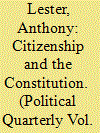| Srl | Item |
| 1 |
ID:
084487


|
|
|
|
|
| Publication |
2008.
|
| Summary/Abstract |
The status of "British subjects", the relationship between the individual and the State, and the concept of "rights" and "liberties" are relevant to the current political debate about "British identity", citizenship, "multiculturalism", a "British Bill of Rights", and whether there is now a need for a written constitution. This article describes the confused contemporary understanding of what is meant by "British" citizenship and analyses the parallel developments of citizenship and our constitutional arrangements. The Human Rights Act, devolution and Gordon Brown's proposed constitutional renewal are important steps in setting out the ideas and principles that bind us together as a nation. Together with a coherent definition of the rights and obligations of British citizenship, constitutional reform would achieve a stronger sense of what it means to be British today.
|
|
|
|
|
|
|
|
|
|
|
|
|
|
|
|
| 2 |
ID:
095284


|
|
|
|
|
| Publication |
2010.
|
| Summary/Abstract |
Anthony Lester tackles the complex and sensitive issues of multiculturalism and free speech. He explores the various meanings given to multiculturalism, integration and assimilation, as well as the relationship between the right to equality and dignity for ethnic and religious minorities and the right to freedom of expression. Placing our multicultural society in its historical context, he considers the treatment of Commonwealth immigrants in the 1960s and 1970s and discusses more recent confrontations involving racial or religious groups which have raised the right to free speech. He argues that our approach to integration and cultural diversity should promote equality and individuality but resist unreasonable demands to respect customs and practices which, for example, harm the rights of women and children, in the name of misguided multiculturalism. We must guard against political correctness that panders to the thin-skinned but remember that the right to offend does not mean a duty to do so.
|
|
|
|
|
|
|
|
|
|
|
|
|
|
|
|